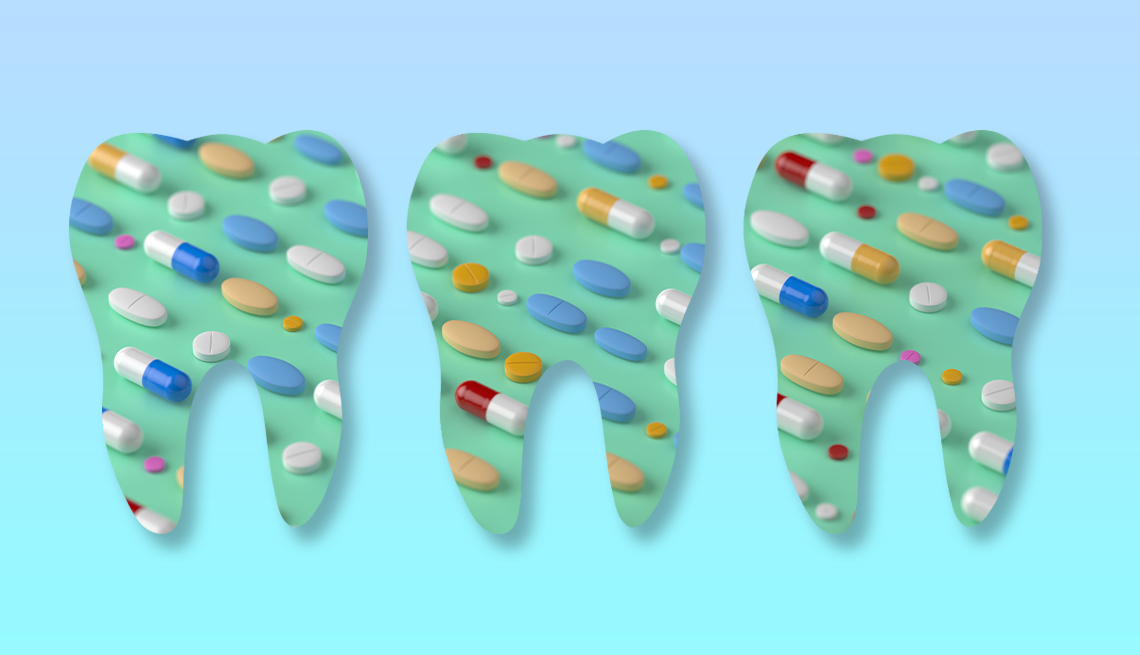
- Select a language for the TTS:
- UK English Female
- UK English Male
- US English Female
- US English Male
- Australian Female
- Australian Male
- Language selected: (auto detect) - EN
Play all audios:
THE FIXES BE PROACTIVE. Talk to your doctor about potential alternatives to bisphosphonate drugs that may pose less risk. Before scheduling dental work, discuss your osteoporosis drug
history with your oral surgeon and doctor. Typically, the longer a patient is on this medication, the higher the risk is for ONJ. Proactive dental care before and during antiresorptive drug
therapy can reduce the risk of developing ONJ by as much as 50 percent. KEEP IT CLEAN. Treatment depends on the stage of ONJ at diagnosis. Once all of the bone tissue dies, it can’t be
revived. But if caught early, doctors can help reduce bone loss. In the early stages, approximately half of patients will heal through nonsurgical debridement. This involves gently scrubbing
the exposed bone twice a day with a prescription-strength antiseptic mouth rinse and a soft baby toothbrush or Q-tip. This helps removes bacteria off of the surface of the bone to prevent
it from getting infected and to aid in tissue healing. It also helps loosen things up: Over time, the gums regrow underneath the dead bone and it pops right out. CONSIDER SURGERY. Those who
don’t heal experience increased pain and recurrent infections, requiring surgery. An oral surgeon who has experience with ONJ removes the dead bone, along with any teeth that may be touching
it and a bit of tissue, to make sure no diseased cells remain. 6. SOME ANTIDEPRESSANTS AND ANXIETY MEDS WHAT IT CAN CAUSE: Dry mouth that can increase risk for cavities, gum disease and
canker sores. Saliva not only lubricates the mouth, but it also neutralizes the acid produced in the mouth. But as we age, our salivary glands become less active, making us more susceptible
to tooth decay. Add to the mix the medications that further reduce our salivary flow, and this can lead to trouble. Without good salivary flow, food can accumulate, putting you at risk for
cavities, gum disease, bad breath and fungal infections. And since the mouth’s mucosal lining is protected by that coating of saliva, you can get canker sores more frequently. Not having
enough saliva can affect taste perception, notes Fatahzadeh, because food particles have to be dissolved in the saliva to stimulate the receptors in the mouth. “A patient may have a tendency
to put more [seasoning] in their food,” she says. “Imagine someone who is hypertensive putting more salt in their diet, or a diabetic putting more sugar in their drink.” COMMON CULPRITS:
Dry mouth is a potential side effect of literally hundreds of medications that interrupt the secretion of saliva. In particular, drugs that alter our central nervous system, including
anxiety meds such as escitalopram (Lexapro) and sertraline (Zoloft), and antidepressants such as fluoxetine (Prozac) and alprazolam (Xanax). “They can suppress the production of
acetylcholine, a neurotransmitter that stimulates the production of saliva by the central nervous system,” Sanders says. ALSO ON THE LIST: meds to treat urinary incontinence or an overactive
bladder, such as oxybutynin chloride (Ditropan XL) and oxybutynin (Oxytrol); Parkinson’s disease medications, such as levodopa, also called L-dopa (Sinemet); blood pressure and heart
medications, including ACE inhibitors such as lisinopril (Prinivil and Zestril), enalapril (Innovace) and benazepril (Lotensin); and beta-blockers such as metoprolol succinate (Lopressor
and Toprol XL). Plus, not surprisingly, diuretics which help rid your body of water and salt to bring down blood pressure, such as furosemide (Lasix). Radiation therapy and chemotherapy may
also damage the salivary glands. THE FIXES If this is a serious problem, perhaps the medication can be changed. If that isn’t possible, the patient needs a strategy to minimize symptoms.
CHEW ON IT. Stimulate the salivary glands and keep your mouth moisturized by chomping on sugar-free gum or sucking on sugar-free candy periodically throughout the day. MOISTURIZE YOUR MOUTH.
Keep a water bottle nearby and take sips throughout the day, Fatahzadeh says. “Fill a spray bottle with water and spritz your mouth to create a coating on the mucosa.” Limit your caffeine
intake: Consuming a lot of coffee, tea or soda can make dry mouth worse. Rinsing your mouth in the morning and at night with an alcohol-free mouthwash after brushing your teeth can help
reduce dry mouth. Mouthwashes that contain xylitol (such as Act Dry Mouth Mouthwash) have been shown to promote saliva production. TRY AN OVER-THE-COUNTER SALIVA SUBSTITUTE. Products such as
Allday Dry Mouth Spray can help keep the mouth lubricated. For severe dry mouth, physicians may prescribe medications such as Salagen or Evoxac to help stimulate saliva production. TURN ON
THE HUMIDIFIER. “If you’re a mouth breather who wakes up feeling parched,” Fatahzadeh says, “put a humidifier next to your bed to add moisture to the air and to make your mouth less dry when
you wake up.” 7. NONSTEROIDAL ANTI-INFLAMMATORY DRUGS (NSAIDS) USED TO RELIEVE PAIN AND REDUCE INFLAMMATION WHAT THEY CAN CAUSE: Painful soft tissue reactions, including mucositis
(inflammation of the mucous membrane that lines the inside of the mouth), and ulcerated sores, which can occur inside the mouth or on the tongue. COMMON CULPRITS: NSAIDs such as ibuprofen
and aspirin, for starters. Other potential irritants include hypoglycemic agents for type 2 diabetes such as metformin (Fortamet or Glucophage); beta-blockers, including metoprolol
succinate (Toprol XL) and bisoprolol (Zebeta), used by those with angina, high blood pressure and abnormal heart rhythm to help the heart beat more slowly; and immunosuppressive agents,
among them prednisone (Deltasone) and methotrexate (Otrexup and Trexall), which prevent the immune system from damaging healthy cells and are usually taken by people with autoimmune diseases
such as rheumatoid arthritis, multiple sclerosis and inflammatory bowel disease. Chemotherapy and radiation therapy may cause changes in the lining of the mouth and the salivary glands,
upsetting the healthy balance of bacteria. In addition: “Quick-dissolving tablets that dissolve under, or on top of, your tongue can cause irritation at the site,” Sanders says. Among them:
nitroglycerine tablets (Nitrostat) used to prevent angina (chest pain) caused by coronary artery disease, anti-nausea medications such as ondansetron (Zofran), or benzodiazepines such as
lorazepam (Ativan), which target anxiety or sleeping problems. THE FIXES KEEP YOUR MOUTH IN GOOD SHAPE. Good oral care can help prevent or decrease the severity of mucositis as well as
infections. See your dentist regularly to make sure your gums are healthy. “Mucositis can make dental problems, such as preexisting gingivitis, even more painful and cause more bleeding when
you brush,” Fatahzadeh says. “That can interfere with oral hygiene, and you may end up getting cavities on top of everything else.” Start by brushing with a soft-bristle brush, which is
easy on your gums. Still experiencing sensitivity? Swap your toothbrush for a foam swab. GENTLE, PLEASE. “Many toothpastes have additives like anti-plaque, anti-tartar and whitening
ingredients, which can cause adverse reactions in some people,” says dentist Mark Wenzel, clinical assistant professor in the Division of Restorative and Prosthetic Dentistry at The
Ohio State University Wexner Medical Center. Strong minty or cinnamon flavoring agents, dyes, gritty particles and foaming agents such as sodium lauryl sulfate can also irritate the mouth.
Choose a mild formula — maybe one with baking soda. “Do adequate brushing with a toothpaste that has plain old fluoride, and you’re going to be fine,” Wenzel notes. While you’re at it,
stick with an alcohol-free mouthwash, which is less likely to cause a burning sensation. EAT (AND DRINK) SMART. Avoid spicy, salty or hot foods and drinks until your mouth heals. Hard, sharp
munchies (think potato chips or crackers) can also hurt tissue that’s swollen. Stick with soft foods (or moisten with broth or sauces). Also, steer clear of alcohol, drinks with caffeine
and acidic juices. EASE THE STING. Cryotherapy, as in sucking on ice chips, is sometimes used by cancer patients to prevent mucositis caused by chemo treatments. Try the same thing at home,
allowing the chips to slowly dissolve in your mouth. Or create a soothing homemade mouth rinse by mixing a teaspoon of baking soda and a teaspoon of salt in 4 cups of warm water. Swish the
solution around in your mouth, then spit it out. Keep the remaining solution in a covered container at room temperature and use throughout the day. (Bonus: It helps keep the inflamed tissue
clean.) STOP PUFFING. The heat and chemicals in tobacco irritate the mucous membranes. GET AN RX. Your physician or dentist may prescribe a rinse or a topical coating agent, such as
hydrocortisone buccal tablets (they stick gently to the inside of your mouth, releasing hydrocortisone as they dissolve), to coat the mucosa, forming a protective barrier to minimize any
pain you might feel while eating or drinking. BRING OUT THE BIG GUNS. “If someone has mouth sores from chemotherapy, there’s a product your dentist or physician can prescribe, called ‘magic
mouthwash,’ ” Shuman says. “It’s kind of a catchall that contains a mixture of medications, such as Benadryl and Maalox, along with other ingredients — for example, an anesthetic,
antibiotic or an antifungal med to coat the tissues.” 3 MOUTH MISERIES Common meds can cause these oral health problems as well 1. BLACK HAIRY TONGUE This may sound horrible, but black
hairy tongue is a pretty harmless and temporary condition in which the top of your tongue looks dark and, well, furry. COMMON CULPRITS: Certain oral antibiotics can change the balance of
bacteria that naturally live in your mouth. The bacteria builds up on tiny rounded projections called papillae that lie along the surface of the tongue. Instead of shedding, as they normally
do, the papillae start to grow and lengthen, creating hairlike projections. THE FIX: This condition usually goes away on its own after you finish taking the antibiotic. In the meantime,
gently brushing your tongue whenever you brush your teeth may help. 2. ORAL THRUSH Otherwise known as oral candidosis, this infection can cause soreness or redness, creamy-white lesions on
the tongue, pain while eating or swallowing, loss of taste or a constant “cottony” taste in the mouth. COMMON CULPRITS: Antibiotics and corticosteroid inhalers for asthma and chronic
obstructive pulmonary disease (COPD), when some of the medication ends up in your mouth, instead of going into your lungs. THE FIX: To avoid this problem, remember to take a nice deep breath
when using an inhaler, and thoroughly rinse your mouth after each dose. Your physician can also prescribe an antifungal medication. 3. BURNING MOUTH SYNDROME If that four-alarm fire in
your mouth isn’t coming from a sore, you may have burning mouth syndrome (BMS), a condition often described as a scalding sensation in the tongue, lips or roof the mouth. It can last for
months or even years. COMMON CULPRITS: When BMS seems to occur for no apparent reason, it’s called “primary burning mouth syndrome.” When there appears to be an underlying trigger, such as a
drug you’re taking, it’s known as “secondary burning mouth syndrome.” Meds that have been known to bring on a nasty bout include ACE inhibitors (for high blood pressure or treatment of
heart failure), antibiotics, thyroid medications and antidepressants. THE FIX: Target the underlying cause of your symptoms, or try cognitive behavioral therapy to help cope with the pain.
Good oral hygiene is a must. _Barbara Stepko is a longtime health and lifestyle writer and the former editor at _Women’s Health_ and _InStyle_. Her work has appeared in _The Wall Street
Journal, Parade_ and other national magazines._






:max_bytes(150000):strip_icc():focal(665x0:667x2)/michael-douglas-catherine-zeta-jones-2000-53270c3ad5344617bda46c9f66071167.jpg)